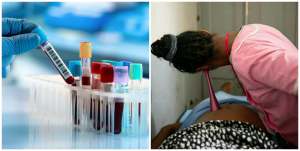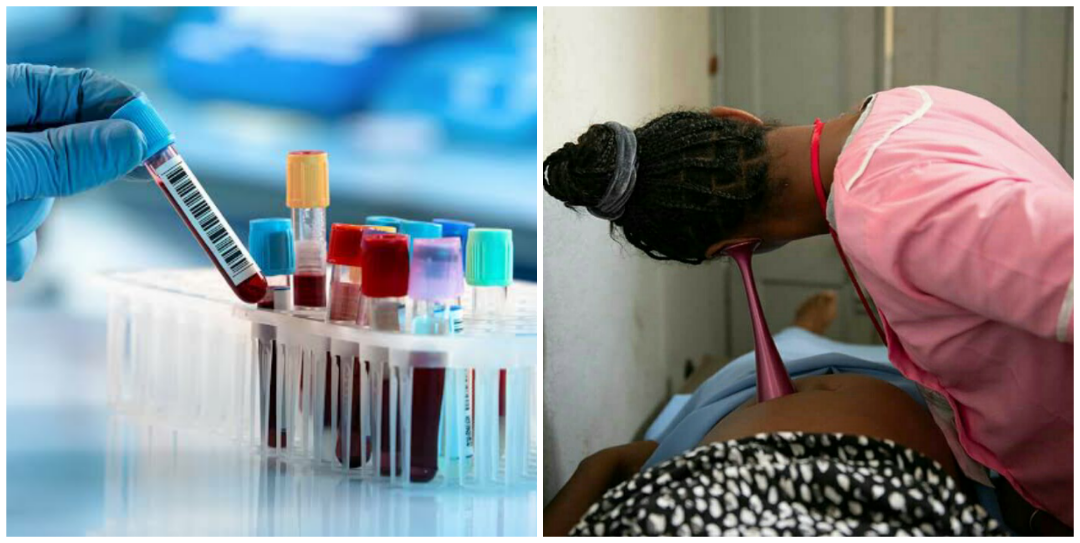List of 14 routine antenatal tests in Nigeria that all pregnant women must do, antenatal booking investigations.
Congratulations you are pregnant and it have started antenatal. Kudos.
Antenatal or prenatal care is an encompassing care aimed at arriving at a favourable outcome for both the woman and her baby.
It involves seeing a doctor to examine you and evaluate the well being of your baby, getting the appropriate antenatal medications, blood pressure checks, counselling on labour, diet, breastfeeding and immunization, getting your tetanus prophylaxis immunization and more.
A key component of antenatal care in Nigeria or any part of the world is the ROUTINE ANTENATAL TESTS or ANTENATAL INVESTIGATIONS which will include blood tests, urine tests, and ultrasound scan (pregnancy scan).
On this page, I am going to discuss the tests your doctor may request for during you antenatal visits below:
1. Packed Cell Volume (PCV) or Full Blood Count (FBC)
On your first day of prenatal visit, your doctor will request you do a baseline blood test called packed cell volume or full blood count. Since most Nigerian women are anemic before they become pregnant, it is important for your doctor to know your baseline blood level and it is your packed cell volume or full blood count that is used to assess that.
2. Blood Group
You and I know the importance of knowing your blood group in pregnancy. You may need to be transfused during delivery and knowing your blood group make it easy to make blood available for you. It also eases the stress encountered when looking for a suitable donor to donate blood for you.

Some hospitals in Nigeria, prepare blood for all pregnant women during antenatal enroute delivery and knowing your blood group is crucial for this laudable policy. Meanwhile, if you already know your blood group and you are sure, there will be no need for blood group test.
PS: Not all delivery or events of delivery will require blood transfusion but you will never know which category you belong. Better safe than sorry.
3. Rhesus group
A blood test. Rhesus group is usually carried out together with blood group. Your doctor will request this test to screen for possible cases of rhesus incompatibility-a life threatening pregnancy complication that can lead to the death of the baby.
This test with determine if your doctor will place you on a drug called Rhogam during pregnancy or immediately after delivery to prevent any untoward complication to your baby or your future unborn baby. This test is very very important, it will determine whether your are Rhesus negative or Rhesus positive.
4. HIV screening
Nigeria has the highest prevalence of HIV after South Africa and it was not surprising when the world health organization recommended that all pregnant women be carefully screened for HIV so as to safeguard the life of the mother and baby. Any positive mother will be placed on specially made HAART medications to prevent maternal to child transmission of HIV.
5. Hepatitis B
A crucial blood test. Hepatitis B screening is very important because it is highly infectious even more than HIV. The child of a mother found to be hepatitis B positive will be given hepatitis B immunoglobulin to prevent him/her from contrasting the virus from the mother.
Knowing your hepatitis b status also helps your doctors and midwives prepare you for delivery.
6. Hepatitis C
Another important test. Your doctor will request for this test to know your hepatitis C status and determine how to prepare you and your baby for delivery if it turns out positive.
7. Genotype
You know this is important since Nigeria is the headquarters of sickle cell anemia in the world. But if you know your genotype before pregnancy and you are sure, no need for this test a second time.
8. Urinalysis (Urine test)
Urine test will help the doctor check if there are proteins or glucose in urine. It helps the doctor determine if you are having hypertension in pregnancy, diabetes in pregnancy or a urinary tract infection. You see why is it is important now?
9. Ultrasound scan
It is only pregnancy scan that will truly confirm if you are pregnant or not. Ultrasound will also tell your doctor the objective age of your baby, weight, size, well-being and rule out the presence or absence of congenital abnormalities.
10. VDRL or Syphilis test
VDRL means venereal disease research laboratory and it is a tool used to test for syphilis. Being pregnant with syphilis infection is very risky to the baby and pregnancy. Your doctor will screen you for syphilis -a sexually transmitted infection. Syphilis can cause miscarriage and make your unborn baby to be born blind. Now you know why VDRL test is important?
11. Pregnancy test
This should even be number on the list, my bad. Yes your are sure you are pregnant but your doctor will have to confirm it with a urine blood pregnancy test or with ultrasound(gold standard).
12. Blood pressure
This is not a test per se but a check. It is important your blood pressure is checked from time to time so that any case of pregnancy induced hypertension (pre-eclampsia) is picked on time and treated appropriately.
13. Fetal Heart Rate
Very important. Your doctor or nurse will have to listen to the heart if your baby to ascertain its well being.
14. Malaria Parasite test
Not every time this test is requested. But if you complain of malaria symptoms, your doctor may request it. Malaria complicates pregnancy.
Any questions? I will answer you in the comments section.




















